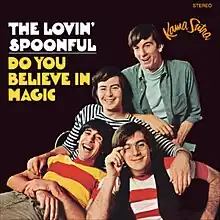| Do You Believe in Magic | ||||
|---|---|---|---|---|
 | ||||
| Studio album by | ||||
| Released | November 1965 | |||
| Recorded | June–September 1965[1] | |||
| Studio |
| |||
| Genre | ||||
| Length | 30:03 | |||
| Label | Kama Sutra | |||
| Producer | Erik Jacobsen | |||
| The Lovin' Spoonful chronology | ||||
| ||||
| Singles from Do You Believe in Magic | ||||
| ||||
Do You Believe in Magic is the debut album by the folk rock group the Lovin' Spoonful. It was released in the United States in November 1965, on the Kama Sutra label. Release in the United Kingdom followed in March 1966. The album features the hits "Do You Believe in Magic" (U.S. No. 9) and "Did You Ever Have to Make Up Your Mind?" (U.S. No. 2).
Do You Believe in Magic was re-released on CD in 2002 with five bonus tracks.
Release and reception
| Review scores | |
|---|---|
| Source | Rating |
| AllMusic | |
| MSN Music (Consumer Guide) | A−[2] |
| Encyclopedia of Popular Music | |
| MusicHound Rock | 3.5/5[7] |
Kama Sutra Records issued Do You Believe in Magic in the United States in November 1965,[1] one month after the title track peaked at number nine on Billboard magazine's Hot 100 chart.[8] In conjunction with the release of the album, the label issued the non-album single "You Didn't Have to Be So Nice".[9][nb 1] The album entered Billboard's Top LPs chart on December 4, 1965,[8] and it initially ran on the chart for 19 weeks, peaking in February 1966 at number 71.[11] After the album fell off the chart in April,[12] Kama Sutra issued another single from it, "Did You Ever Have to Make Up Your Mind?",[13] which peaked at number two on the Hot 100 in June.[8][nb 2] That same month, Do You Believe in Magic re-entered the Top LPs chart,[15] and it spent 16 more weeks on the chart, reaching a new peak in August at number 32.[8]
Pye International Records issued the album in the United Kingdom in March 1966,[16] but it did not chart.[17]
In his AllMusic review, music critic William Ruhlmann wrote "The album elaborated upon Sebastian's gentle, winning songwriting style... The album also revealed the group's jug band roots in its arrangements of traditional songs... The Spoonful would be remembered as a vehicle for Sebastian's songwriting, but Do You Believe in Magic was a well-rounded collection that demonstrated their effectiveness as a group."[5]
Track listing
All tracks are written by John Sebastian, except where noted.
|
Note
- Track lengths are per the original LP liner notes. Songwriting credits are from the 2002 CD remaster.[1]
Charts
| Chart (1965–66) | Peak position |
|---|---|
| US Billboard Top LPs[18] | 32 |
| US Cash Box Top 100 Albums[19] | 71 |
| US Record World 100 Top LPs[20] | 67 |
Notes
- ↑ "You Didn't Have to Be So Nice" was later included on the Lovin' Spoonful's second album, Daydream, issued in February 1966.[10]
- ↑ Before the single's U.S. release in April 1966,[13] Quality Records issued it in December 1965 in select Canadian cities to test its potential performance in the American market.[14]
References
- 1 2 3 4 Edmonds, Ben (2002). Do You Believe in Magic (Liner notes). The Lovin' Spoonful. Buddha Records, Kama Sutra Records. 74465 99730 2.
- 1 2 Christgau, Robert (March 29, 2013). "The Lovin' Spoonful". MSN Music. Retrieved March 30, 2013.
- ↑ Segretto, Mike (2022). "1965". 33 1/3 Revolutions Per Minute - A Critical Trip Through the Rock LP Era, 1955–1999. Backbeat. p. 70. ISBN 9781493064601.
- ↑ Billboard review panel (November 20, 1965). "Album Reviews". Billboard. p. 68.
- 1 2 Ruhlman, William. "Do You Believe in Magic > Review". Allmusic. Retrieved June 15, 2011.
- ↑ Larkin, Colin (2007). Encyclopedia of Popular Music (4th ed.). Oxford University Press. ISBN 978-0195313734.
- ↑ Rucker, Leland (1996). "Lovin' Spoonful / John Sebastian". In Graff, Gary (ed.). MusicHound Rock: The Essential Album Guide. Detroit, Michigan: Visible Ink Press. pp. 422–423. ISBN 0-7876-1037-2 – via the Internet Archive.
- 1 2 3 4 "The Lovin' Spoonful Chart History (Hot 100)". Billboard. Archived from the original on November 21, 2022. Retrieved October 8, 2023.
- ↑ Jackson 2015, p. xx.
- ↑ Diken, Dennis (2002). Daydream (Liner notes). The Lovin' Spoonful. Buddha, BMG Heritage, RCA, Kama Sutra. 74465 99731 2.
- ↑
- ↑ "Billboard Top LP's". Billboard. April 9, 1966. p. 40.
- 1 2 Savage 2015, p. 556.
- ↑
- Anon. (May 23, 1966). "Chris Montez – Top Seller for Quality Records". RPM. p. 7.
- Anon. (January 15, 1966). "Music Capitals of the World". Billboard. p. 28 – via Google Books.
- "A New Lovin' Spoonful Single Available in Canada Only". RPM. January 3, 1966. p. 6.
- ↑ "Billboard Top LP's". Billboard. June 11, 1966. p. 42.
- ↑ Anon. (April 30, 1966). "News Extra: Spoonful LP". Melody Maker. p. 15.
- ↑ "Lovin' Spoonful". Official Charts Company. Archived from the original on 16 August 2022. Retrieved October 8, 2023.
- ↑ "The Lovin' Spoonful Chart History". Billboard. Archived from the original on November 21, 2022. Retrieved August 11, 2023.
- ↑ "Cash Box Top 100 Albums". Cash Box. July 9, 1966. p. 45.
- ↑ "100 Top LP's". Record World. July 16, 1966. p. 18.
Sources
- Jackson, Andrew Grant (2015). 1965: The Most Revolutionary Year in Music. New York City: Macmillan Publishers. ISBN 978-1-4668-6497-9 – via the Internet Archive.
- Savage, Jon (2015). 1966: The Year the Decade Exploded. London: Faber & Faber. ISBN 978-0-571-27762-9 – via the Internet Archive.